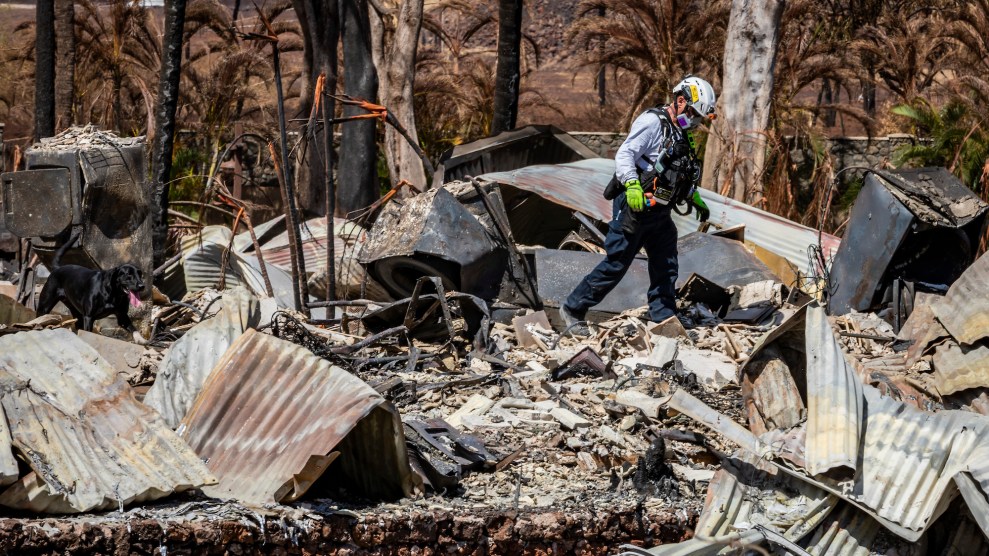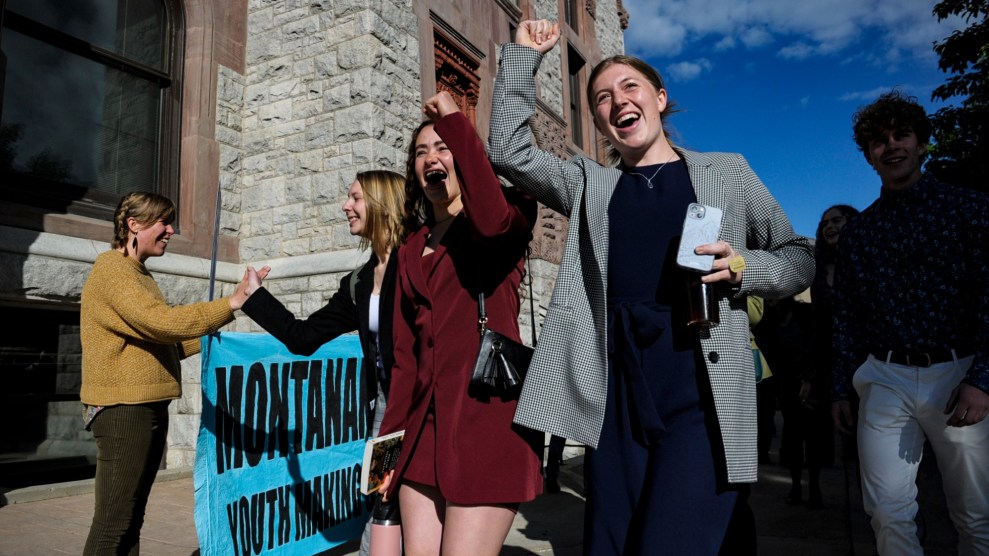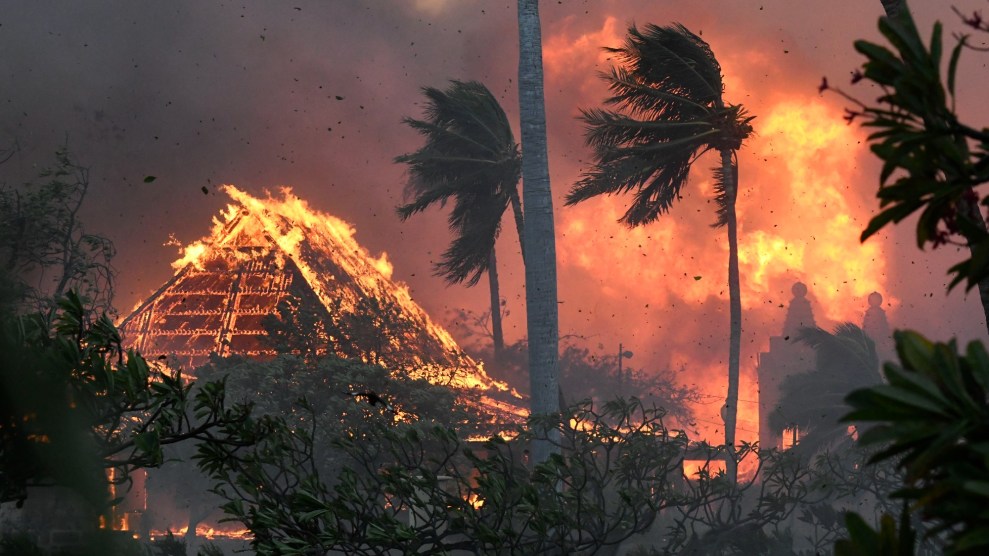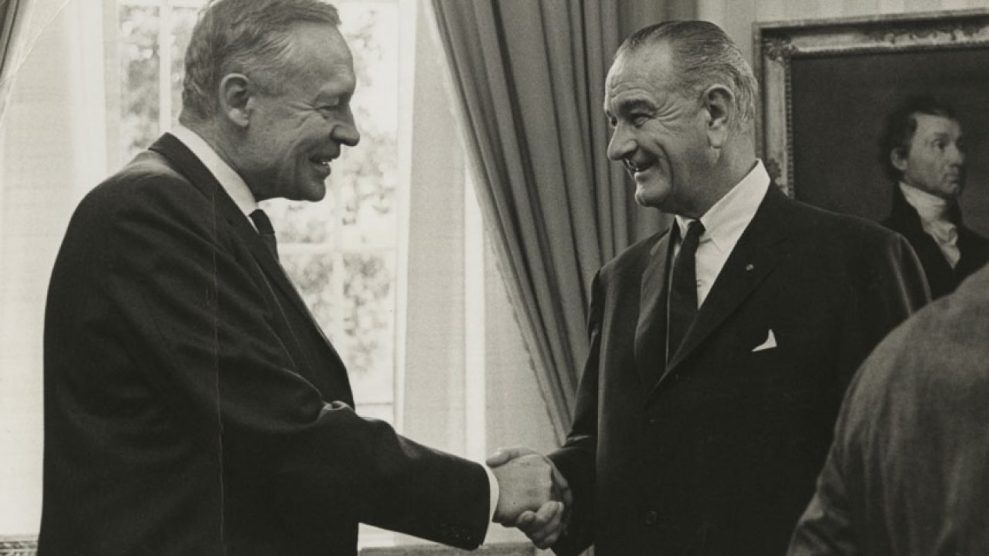
A member of the combined Joint Task Force 50 searches the rubble of homes for human remains in the aftermath of wildfires.Ssgt. Matthew Foster/U.S. Nation/Planet Pix/Zuma
This story was originally published by the Guardian and is reproduced here as part of the Climate Desk collaboration.
Hawaii’s supreme court on Thursday heard attempts by fossil fuel companies to dismiss a climate accountability lawsuit. The hearing came as the deadly fires in Maui capture global headlines.
“This is the first time the court has been in session since the fires in Maui last week,” the Hawaii supreme court chief justice said as the hearing began, before calling for a moment of silence for those who lost their lives in the blazes.
In 2020, officials from the city and county of Honolulu sued eight fossil fuel giants that allegedly knew for decades about the climate dangers of burning coal, oil, and gas, yet actively hid that information from consumers and investors. That misinformation campaign, the lawsuit argues, is a key reason Honolulu is facing the steep costs of abating climate damages from extreme weather events.
“You can think of how Hawaii would have been different if they had stood up 50 years ago and said, ‘If you use our products unabated, your islands are going to be destroyed,’” Vic Sher, attorney for the plaintiffs, said about the defendants at Thursday’s hearing. “They have deprived these public entities of the opportunity to make choices and control their future.”
The case is one of dozens filed against big oil since 2017 by states and municipalities over climate deception, which builds on certain oil companies’ well-documented history of sowing doubt about climate science. Another suit was filed by Maui County, where wildfires among the deadliest in US history have been blazing; that case was at one point consolidated with Honolulu’s.
The fires ravaging Hawaii “underscore the importance” of such litigation, said Denise Antolini, a retired University of Hawaii law professor and supporter of the plaintiffs.
“If the truth had been known about climate change, if the truth had been allowed to be known by big oil, Hawaii might have had a different future,” she said. Though the climate crisis was not the sole cause of the record-breaking fires, she added, it “set the table” for the destruction by fueling unusually hot, dry, flammable conditions.
Fires are just one form of extreme weather the Honolulu case says is plaguing the city and county. Other climate-related public nuisances, including flooding, sea level rise, heatwaves and drought, are together costing the city billions and putting residents and property at risk, the lawsuit says.
The defendants’ attorneys in the Honolulu case have not attempted to argue that climate change is not real or human-caused. In fact, in a 2021 hearing, Chevron attorney Ted Boutrous, speaking for all of the suit’s defendants, said climate change is an “exceedingly important issue of utmost public concern”.
Yet the defendants have filed several motions to dismiss the case, two of which the Hawaii supreme court heard on Thursday afternoon.
“The hearing…is an incredibly important milestone in the case because it determines whether or not the case will proceed to discovery, to further motions and to trial,” said Antolini. “So it’s a go or no-go point.”
The court first heard a “personal jurisdiction” motion, in which the defendants will argue that they did not conduct enough business in Hawaii to be hauled into the state’s courts. After all, the vast majority of planet-heating pollution from the defendants’ fossil fuel products was emitted outside of Hawaii, they claim.
“It’s all about emissions and the consequences of global emissions,” said Chevron attorney Boutrous, who once again represented the defendants, at the hearing.
But that argument is wrongheaded, said Richard Wiles, president of the Center for Climate Integrity, which backs the litigation against the industry.
“This lawsuit is about deception and it alleges that the company engaged in deceptive practices within Honolulu, within Hawaii,” he said.
At the hearing, Sher noted that the defendants operate gas stations, refineries, and storage facilities in Hawaii. Though they argue Hawaii constitutes just a small part of global emissions, “Hawaii was big enough for them to invest in the market here, to promote and sell their fossil fuel products here,” he said.
The defendants’ attorneys also argued a “failure to state a claim” motion, which claims that the lawsuit should be tossed out because the issues with which it grapples should be dealt with by lawmakers, not state courts. Specifically, they argued that both federal common law and the Clean Air Act should pre-empt the lawsuit, meaning they should limit the power of Honolulu’s government to weigh in.
“Our position is that every claim that challenges global emissions as the mechanism…of their injury, is pre-empted by and displaced by the Clean Air Act,” said Boutrous.
Sher disagreed. “The Clean Air Act reduces pollution,” he said. “It does not provide a safe haven for international corporations to dissemble and lie about their products, which is what the defense’s argument boils down to here.”
The first circuit court in Hawaii denied both of these motions to dismiss last year, but the defendants appealed.
“These are delay tactics they’re using to avoid going to court,” said Wiles of the Center for Climate Integrity
One defendant in the Honolulu suit, Chevron, has also filed a third motion to dismiss the case on the grounds that it violates the company’s first amendment rights. That motion was also dismissed by a Hawaii court last year and is moving through a separate appeals process.
A decision on the motions to dismiss the case could take many months to emerge. “We look forward to the court’s forthcoming decision as we continue to litigate the case and move toward trial,” Matthew Gonser, the chief resilience officer and executive director at the city and county of Honolulu’s office of climate change, sustainability, and resiliency, said.
The hearing comes just days after climate campaigners notched a major win in another type of climate lawsuit. On Monday, a Montana judge ruled in favor of 16 youth plaintiffs who sued the state government on the grounds that its pro-fossil fuel policies violated their constitutional rights to a clean and healthy environment.
Advocates say it sets a positive tone for a similar federal lawsuit, Juliana v US, which is set to go to trial in the coming months, and four similar state lawsuits, including one filed by Hawaii youth plaintiffs which will go to trial in June 2024.
The youth-led lawsuits are based on a different legal theory than the Honolulu case and others filed by governments against big oil, Wiles said
“They’re complementary strategies,” he said. “One says you’ve got to get the government to stop backing policies that actually accelerate climate change, and the other says one of the reasons they do that is because of the influence of industry lying and swaying public opinion.”












